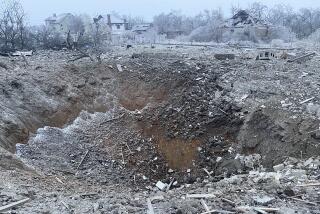Greater Air Threat in Bosnia Urged : Balkans: NATO asks U.N. to streamline procedures and make it easier to launch punitive strikes. But new measures won’t add much deterrent force, officials say.
- Share via
BRUSSELS — After intense prodding from the United States, the 16-nation Atlantic Alliance on Friday formally pressed the United Nations for measures to intensify the use of Western air power in war-torn Bosnia-Herzegovina.
The measures, detailed in a letter to U.N. Secretary General Boutros Boutros-Ghali, would:
* Streamline mandatory consultations between North Atlantic Treaty Organization and U.N. officials before any punitive air strikes against forces violating U.N.-declared weapons exclusion zones.
* Expand the target lists for such reprisal raids.
* Eliminate the need to give violators a warning before attacking.
NATO officials said the measures would change procedures that have proven dangerous to the alliance’s pilots and so cumbersome that they have frequently made raids impossible to carry out.
“By the time the green light comes, our aircraft are out of fuel,” a senior NATO official said.
The overwhelming majority of violations have been by Bosnian Serb forces, who have largely--and so far successfully--ignored U.N. warnings to respect the resolutions establishing the exclusion zones around the cities of Sarajevo and Gorazde, as well as other “safe” areas.
(This week, however, the violations have been committed by Bosnian government troops. In an operation begun a day earlier, U.N. troops intervened in escalating clashes around Sarajevo, expelling more than 500 government troops Friday from a demilitarized zone on Mt. Igman, near a site where 20 Serbs were killed in a commando raid, wire services reported.
(U.N. special envoy Yasushi Akashi had accused the Bosnians of mutilating and burning some of the victims of that raid, but Friday the United Nations withdrew those charges. Spokesman Tim Spicer said: “With the benefit of hindsight, I would say it was an aggressive military attack on a command post . . . there was no suggestion of people being executed.”)
NATO officials said the new measures were desperately needed to restore credibility to the air power deterrent and thus prevent further erosion of these areas.
“We’ve all worked hard to get these zones established, and no one wants to have them eaten away,” the senior NATO official said.
The NATO proposal comes amid U.S. efforts to increase pressure against the Bosnian Serbs to force them to accept a peace agreement worked out by a five-nation group made up of the United States, Britain, France, Germany and Russia.
However, even if accepted by Boutros-Ghali, the measures seem unlikely to have much of an impact because they fail to address the more fundamental differences between NATO and the United Nations that have made allied air power more of a joke than a deterrent in Bosnia.
Despite increasingly brazen violations by Bosnian Serb forces of the exclusion zone around Sarajevo through the summer and early autumn, NATO aircraft have only been ordered into action twice.
The total damage inflicted by the world’s mightiest military alliance during these sorties near the Bosnian capital amounts to the destruction of one outdated anti-tank gun Aug. 5 and a single derelict tank Sept. 22.
This impotence can be traced only in part to the procedures NATO now wants to streamline, according to many of those familiar with the Balkan crisis. The problem lies far more in a failure of political will on the part of the United Nations, which has consistently shied away from using air strikes to protect the exclusion zones, they say.
NATO sources stressed Friday that even under the proposed changes, U.N. representatives would retain their right to veto any air strike that NATO wanted to launch.
The United Nations’ failure to be more aggressive in defending its exclusion zones has steadily increased tensions with NATO. One measure of those tensions is that NATO ambassadors spent three days drafting their letter; apparently they feared that Boutros-Ghali would reject a too-sharply worded demand as an affront, but not take seriously a too-politely worded request.
More to Read
Sign up for Essential California
The most important California stories and recommendations in your inbox every morning.
You may occasionally receive promotional content from the Los Angeles Times.













